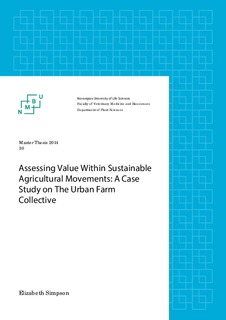| dc.contributor.author | Simpson, Elizabeth | |
| dc.date.accessioned | 2014-07-29T11:44:20Z | |
| dc.date.available | 2014-07-29T11:44:20Z | |
| dc.date.copyright | 2014 | |
| dc.date.issued | 2014-07-29 | |
| dc.identifier.uri | http://hdl.handle.net/11250/198877 | |
| dc.description.abstract | In North American many people are unable to have their food needs met because of
economic constraints. Current economic models in the U.S. support a bottom line approach that
emphasizes the importance of getting the most goods and services to the highest number of
people with the smallest amount of monetary resources possible. This approach does not take
into account the relative value of natural systems and human interactions and therefore does not
present an accurate representation of all possible costs. While repairing or recreating our
economic system is a daunting task, analyzing what people find as having value in the United
States will continue to build on the dialogue of how we will create such a shift.
The Urban Farm Collective in Portland, Oregon takes an interesting approach in its
attempts to meet the food needs of its community. This paper will examine where the members
of the Urban Farm Collective place value and explore how certain disciplines, movements and
philosophies express their desire to create a new economic system. | nb_NO |
| dc.language.iso | eng | nb_NO |
| dc.publisher | Norwegian University of Life Sciences, Ås | |
| dc.subject | VDP::Landbruks- og Fiskerifag: 900::Landbruksfag: 910::Naturressursforvaltning: 914 | nb_NO |
| dc.subject | Urban Farm Collective | nb_NO |
| dc.subject | Agroecology | nb_NO |
| dc.subject | Value | nb_NO |
| dc.title | Assessing value within sustainable agricultural movements : a case study on the urban farm collective | nb_NO |
| dc.type | Master thesis | nb_NO |
| dc.source.pagenumber | 121 | nb_NO |
| dc.description.localcode | M-AE | nb_NO |
